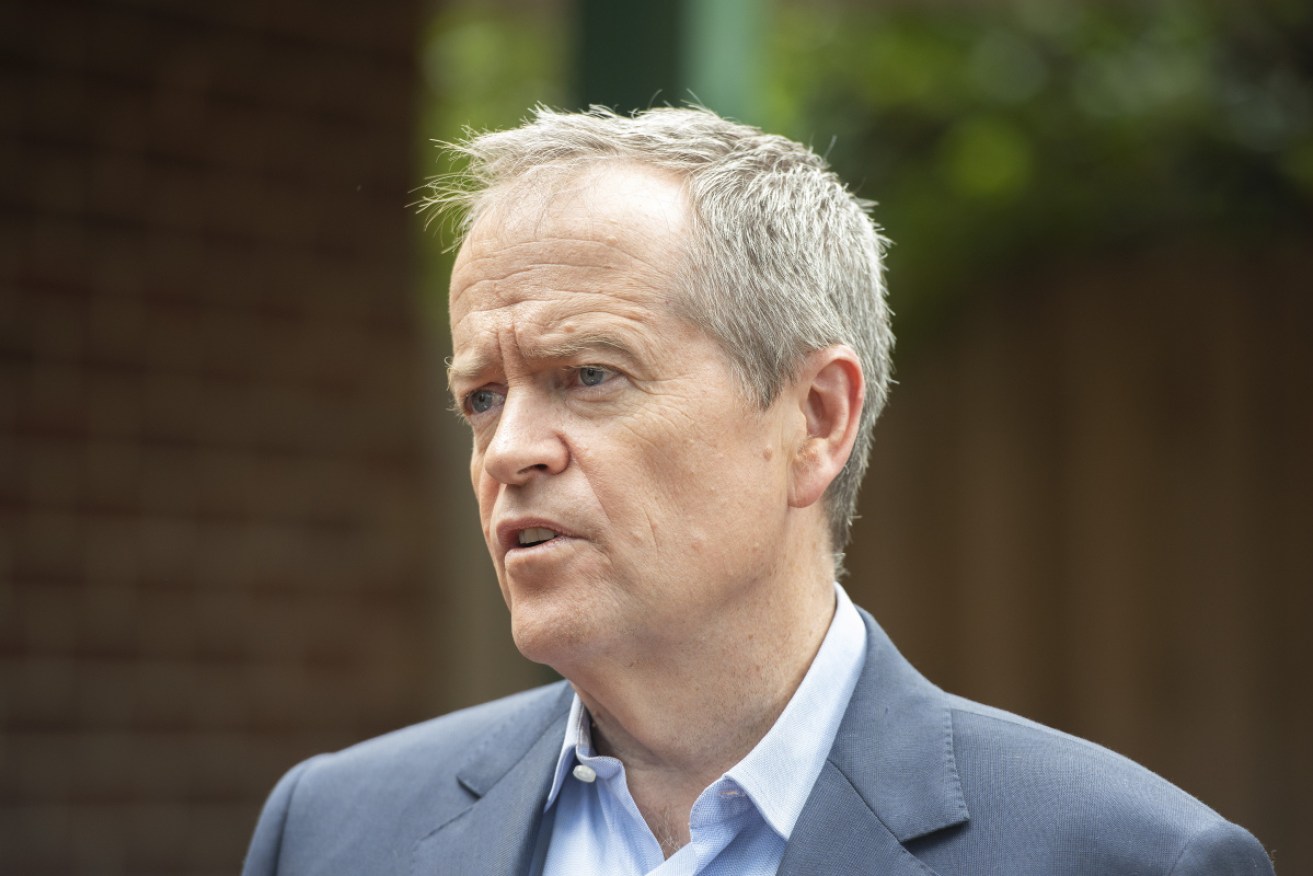Bill Shorten’s lack of popularity a factor in loss: internal report


Bill Shorten says workers don't have to use holiday leave before claiming the pandemic payment. Photo: AAP
Bill Shorten’s lack of popularity with voters, poor strategy and a failure to adapt to the leadership change to Scott Morrison are the three main factors behind the Labor party’s shock election loss according to the party’s official post-mortem.
The report also calls for spending caps to stop billionaire businessmen including Clive Palmer spending $70 million on advertising in the future.
Mr Palmer outspent both the major parties, but failed to secure a seat. However, it swamped Labor’s campaign and helped deliver Queensland to the Liberals through preference deals.
“This is a serious threat to democracy,” the report’s author Jay Weatherill said. “And we do recommend that there are spending caps to high net worth individuals.”
Last month, Mr Palmer said Labor’s calls for spending caps were about the ALP being “bad losers”.
But the report, released today by the ALP, rejects calls to entirely dump controversial tax policies including the so-called ‘retiree tax’, the franking credits reforms or negative gearing arguing it was the complexity of the policy that was the issue. It finds the so-called ‘death tax’ scare campaign was small factor in the result.
“Labor’s tax policies did not cost the Party the election,” the report states.
“But the size and complexity of Labor’s spending announcements, totalling more than $100 billion, drove its tax policies and exposed Labor to a Coalition attack that fuelled anxieties among insecure, low-income couples in outer-urban and regional Australia that Labor would crash the economy and risk their jobs.”
The report also finds that “the tragedy” of the election was that dodgy polls that predicted a Labor victory lulled the ALP into pursuing a risky policy agenda convinced it was supported voters.
The New Daily was leaked the ALP’s entire tracking poll just 48 hours after the May 18 election after bitter divisions within the campaign over the decision to use the Newspoll pollsters YouGov-Galaxy to conduct Labor’s research.
“An industry-wide failure resulted in polling consistently overestimating the Labor vote and underestimating Coalition support. Labor struggled to process internal research that ran counter to its expected win,” the report states.
“The campaign track was persistently less optimistic than the published polling, but inaccuracies in the overall research program led Labor to believe it was slightly ahead when it was, in fact, behind.”
The 30,000 word report includes more than 60 findings and dozens of recommendations.
It finds that Labor did not settle on a persuasive strategy for winning the election, no formal campaign committee was established and that Labor did not craft a simple narrative that unified its many policies.
The campaign culture did not encourage dialogue and challenge, “which led to the dismissal of warnings from within the Party about the campaign’s direction.”
Labor also targeted too many seats, such that resources were spread too thinly and the campaign’s impact was diluted. Crucially it finds that, “Labor’s election campaign did not adapt to the new Liberal leader and his reframing of the election as a choice between himself and Bill Shorten.”
It finds that voter trust in politics globally and in Australia has collapsed, resulting in economically insecure, lower-income voters treating all political promises with extreme scepticism while being highly receptive to negative campaigns.
The reasons for Labor’s decision to pursue new tax measures were “heavily influenced by a desire to cover the cost of large, new spending policies and deliver a better budget bottom line than the Government.”
The report finds that the high expectations of a Labor victory at the 2019 election were based on published opinion polls, betting agencies, the Party’s performance at the 2016 federal election and in key by-elections.
“High expectations of a Labor victory and a desire to secure a mandate for Labor’s program in government influenced Labor’s decision to announce a bold, expansive and highly detailed policy agenda comprising more than 250 costed policies,” the report states.
“Labor’s policies on negative gearing and franking credits were used with other revenue measures to fund large, new spending initiatives, exposing Labor to a Coalition attack that these spending measures would risk the Budget, the economy and the jobs of economically insecure, low-income workers.”
Labor’s climate change policy won the ALP among young and affluent older voters in urban areas but cost the party votes in other states.
“Labor’s ambiguous language on Adani, combined with some anti-coal rhetoric and the Coalition’s campaign associating Labor with the Greens in voters’ minds, devastated its support in the coal mining communities of regional Queensland and the Hunter Valley,” it states.
Shorten jumps the gun
Jumping the gun on the release of the review today, Mr Shorten said if he had his time again he would have adopted a different approach to franking credits but he does not argue he would have abandoned the policy entirely.
“Were the universe to grant re-runs, I would campaign with fewer messages, more greatly emphasise the jobs opportunities in renewable energies, and take a different position on franking credits,” Mr Shorten said.
“In 2018 I presided over a bigger tax cut plan than the Liberals for ten million working Australians but I concede, with hindsight, when they matched ours we should have gone bigger again,” he added.
And in a clear message to his critics, Mr Shorten said he planned to remain in public life for decades.
“Our great party must focus on addressing the structural and base issues that parties of labour around the world are facing so we can win the next election,” he said.
“I’m personally committed to continue contributing in public life, serving my constituents, the people of Australia – including people with disabilities and the vulnerable – for the next 20 years.”
Mr Shorten also put the blame on Clive Palmer’s $70 million advertising binge. The review is expected to canvass debate on spending caps.
“I note the review considered the relentless and unprecedented multi-million dollar political attacks on me by Palmer and the Liberals successfully tarnished my public standing,” he said.
Labor leader Anthony Albanese will issue a formal response to the review at the National Press Club on Friday.








